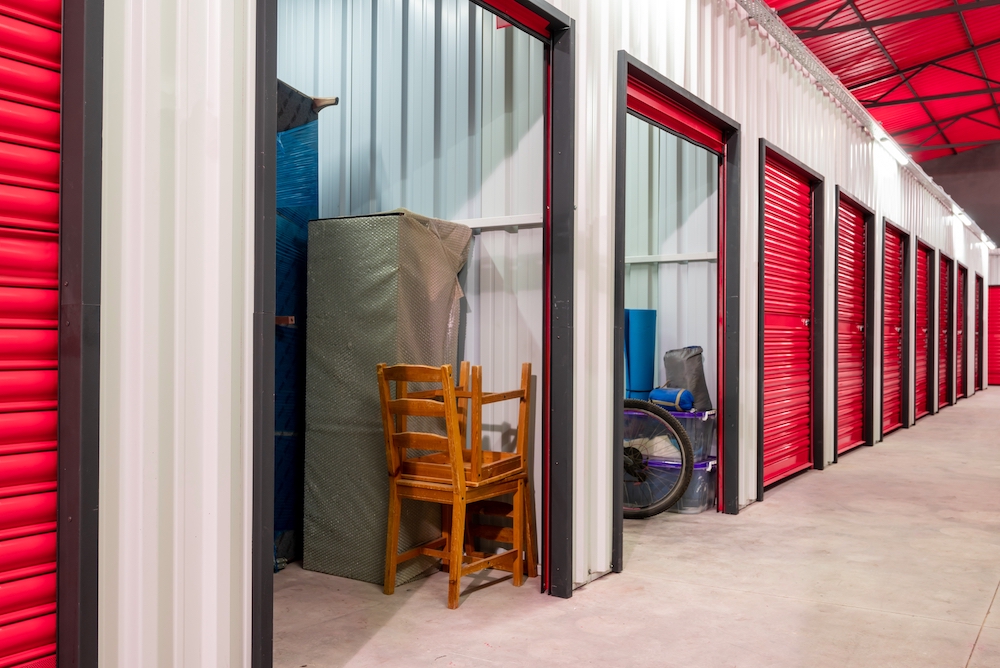Self-storage can be beneficial if you’re going away, moving house, or having a clearout but don’t want to dispose of any items. Renting a self-storage unit can save money and keep your personal belongings safe due to their security features.
Whether you’re looking for a small unit for general belongings or need vehicle storage, FindStorageFast offers a range of solutions. If you’re new to self-storage, we’ve put this helpful guide together to help you find the right storage unit for your needs.
What are self-storage units?
Self-storage units are spaces where you can store your personal belongings or business items. They come in a variety of sizes and types to accommodate everyone’s needs. Many storage facilities have monthly rolling contracts, but customers can also store their items for longer periods.
It’s important to remember that storage units are for storing belongings only – it is illegal to live in a unit.
The types of self-storage units:
- Climate-Controlled Units: If you’re storing electronics, important documents, and important belongings, climate-controlled units maintain consistent temperatures and prevent excess humidity from ruining the items.
- Drive-Up Units: These units are often on the ground floor, which enables you to drive up to them for seamless loading and unloading. If you’re looking for car storage or boat storage, drive-up units are best.
- Indoor Units: Located in a building, indoor units provide extra protection against the weather and enhanced security. They’re ideal for business storage and general items.
- Outdoor Units: Outdoor units are generally best for RV storage and Car Storage as well as large equipment that doesn’t need to be protected from the elements.
What’s the difference between self-storage and full-service storage?
Full-service storage can be ideal if you’re short on time. The company will collect your items and take them to the unit. Think of it like a valet service, where you don’t have to worry about transportation or unpacking your belongings.
With self-storage, you’re responsible for getting your items to the unit and maintaining them. Self-storage is more popular because it’s less expensive than full-service units. Most people are happy to pack their belongings and take them to the unit, which saves a lot of money.
Why might I need self-storage facilities?
People rent storage units for a range of reasons, including decluttering their homes, moving house, or going away for a long time. If you won’t be using your belongings for a while but want to protect them, a storage facility can provide security and prevent theft.
College students
Most students return home during summer break, and storage units are a great alternative to taking your belongings home. They save a lot of time and keep everything safe until you return back to college.
Seasonal items
Why clutter your home and shed when you can rent a unit for seasonal items? Things like Christmas trees, decorations, skiing equipment, and lawnmowers can go into storage, giving you plenty of extra space.
Moving home
It’s rare to achieve the perfect balancing act between moving out of one property and straight into another. If you need to vacate your current home before moving into the new one, storage units can be lifelines, as they’re a secure place to put your belongings.
Renovations
Preparing for an exciting home renovation? Dust and debris can damage your belongings, and storing things outside can expose them to the elements. Short-term storage units enable you to complete the renovations and move your belongings back into the property.
Decluttering
Getting your Marie Kondo on? Decluttering can be stressful, but you can create more space in your home. Instead of leaving cardboard boxes in the garage, opting for a storage unit means you can access the belongings easily and protect them from damage.
Storing and Organizing Electronics
Electronics like computers, gaming systems, and entertainment equipment often require special care during storage. These items are sensitive to temperature, dust, and humidity, which makes climate-controlled storage units the best option. Be sure to wrap cords separately, use original boxes where possible, and clearly label everything to simplify setup later.
Alternatively, freeing up cluttered areas at home can give you the opportunity to repurpose space—perhaps by building a home office, setting up a creative studio, or installing a home theater to enjoy your media in a dedicated, optimized environment.
Vehicle storage
Storage is a great solution if your property lacks room or you want to keep expensive boats, RVs, motorbikes, and classic cars safe. You’ll be able to access the vehicles when needed but have a secure place to prevent theft.

Finding the right storage unit for your needs
With so many storage unit providers available, finding one that fits your needs and budget can be challenging. Our Storage Finder enables you to find suitable providers across the USA and Canada. Just enter your city, address, or ZIP into the search bar and review top-rated facilities.
Decide what you need from a storage unit by considering the following factors.
Which items are you storing?
Are you storing clothes, furniture, or valuable items? Climate-controlled storage can be beneficial, as it prevents damage. General items are suitable for non-climate-controlled units, which often have more affordable rates.
If you want to store a car, boat, or RV, you’ll need a drive-up or outdoor unit. Expensive electronics or sports equipment can go in an indoor unit, as they won’t require as much space.
How long will you need the unit?
Consider how long you’ll store the items. If you’re waiting to move into a new property or on vacation, short-term storage units are fine. But if you won’t use the items for a while, long-term storage is the better solution.
You can also save money by choosing long-term storage, as you’ll pay a set rate and won’t need to renew your rental contract.
Which storage unit size will you need?

Most storage facilities offer a range of self-storage unit sizes, but larger units will cost more. The storage providers we work with usually offer units that range from 5×10 to 10×30, with the smallest units able to hold small items and larger sizes accommodating a whole room’s worth of items.
Outdoor storage units are much larger, with most providing plenty of room for RVs and other large vehicles. While large units have a higher monthly cost, they can be more affordable than renting multiple small units. Our storage unit size guide can help you figure out which option is best.
Which features do you want?
Basic storage units will offer security and access, but some provide extra features. While these units might cost more, the following features can be beneficial:
- 24/7 Access
- CCTV
- In-Person Surveillance
- Flexible Contracts
- Climate Control
General storage units are OK if you want to save money and are happy to have basic security features, but advanced features offer more protection and security.
Does the facility have a good reputation?
Looking for a storage unit online is more convenient than visiting multiple sites in person, but there are some risks. Ensure the facility has security procedures and photographs of the units. It’s also a good idea to check reviews and get an idea of how the facility provides security.
The storage unit rental process
So, now you know about storage units, it’s time to reveal how to simplify the rental process and enjoy more convenience. Most facilities will ask you to sign a contract and need to see your documentation, including a passport, driver’s license, or military ID.
The rental agreement
When you lease a unit, the provider will ask you to sign a legally binding contract—also known as the rental agreement. Whether you’re signing it online or at the facility, remember to read the information carefully and understand your obligations.
The contract will outline your responsibilities, the security deposit amount, monthly payments, additional fees (including lost key replacements), storage limitations, restrictions on how you can use the unit, and cancellation terms.
Preparing your items
All units have rules about which items can be stored, including restrictions for hazardous items such as chemicals and fireworks. Storing these items could lead to fires and other risks, resulting in fines and even legal action.
It’s a good idea to inventory everything you’re storing and clearly document it. Taking photos gives you visual evidence, which can help you recover financial losses should a theft occur.

Packing your belongings
Whether you choose general or climate-controlled self-storage units, it’s essential to prepare your items before transporting them. Packing them correctly will prevent damage and ensure you can access your things as and when needed.
Washing your clothes and ensuring each item is dry prevents mildew and mold growth. Disassembling heavy items, such as furniture and exercise equipment, can create more space—just make sure you store the components together.
Use bubble wrap and protective materials to prevent damage, and clearly label each box.
Transporting your items
Now for the last step: getting your items to the storage facility. Full-service units pick your items up, but it’s easy to use your car and take multiple trips. Renting a truck might be easier, and the outright costs are usually less than paying for a full-service facility.
Some storage companies will also provide free trucks in select locations. Ask your chosen facility whether they offer this service.
Insuring your items
If you have renter’s or homeowner’s insurance, your personal belongings might already be covered. If not, it’s a good idea to secure a policy before storing them.
Insurance policies can be invaluable when your items are stolen or damaged. They pay for replacements and prevent significant financial losses. Some units offer insurance as part of your contract, or you can choose it as an add-on product.
While insuring the items will cost more, a small monthly expense outweighs the costs of replacing valuable antiques, jewellery, clothing and even vehicles.
Find your self-storage unit today
Self-storage is a flexible solution for protecting your personal items. Whether you’re going away, looking for a convenient way to declutter your home, or need a long-term storage solution, we have a range of facilities available.
Using our website means you can compare storage units and save money on facilities. Remember to check reviews and select a storage unit size that fits your needs.
Need some support? Call our customer service team at 1-866-690-7730. We’re always here to answer any questions.
FAQs
How do I know which storage unit size I need?
Think about what you’ll be storing and decide based on your immediate and future requirements. For example, if you only have a few cardboard boxes, a 5×10 unit will be sufficient. If you might need more space in the future, choosing a larger unit means you can add items as and when required.
Why is vehicle self-storage better than using my driveway?
If you’re moving to a new home or going away for a while, storing your vehicle in a secure facility is better than leaving it in a long-term parking space. Self-storage units – even outdoor ones – usually have shielded areas, which can protect the vehicle from hail, snow, and excess rainfall.
Most importantly, storage units offer more security and prevent theft.
Why use FindStorageFast?
At FindStorageFast, we simplify your search for the perfect unit. Instead of going through Google and visiting multiple websites, you can enter your location into our convenient search bar and view available facilities in your area.
We’re committed to customer satisfaction and regularly review units to ensure they align with our values. Whether you’re looking for basic storage at low rates or want an ongoing solution, our website can help.
What happens if my items are exposed to moisture?
Clothing, furniture, and valuable items should never be exposed to excess moisture. When this happens, they can accumulate mildew and mold, which will destroy them. Once mold spores begin to take over your items, you’ll need to dispose of them.
Choosing climate-controlled self-storage units can prevent mold and moisture growth, preventing expensive replacements. Many insurers also won’t cover the costs of damaged belongings if you don’t care for them correctly.


